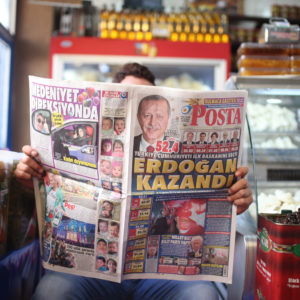Soon after Turkish President Recep Tayyip Erdogan claimed victory in Sunday’s election, the president of the Council on Foreign Relations, Richard N. Haass, tweeted a grim assessment: “What we are witnessing is the end for now and possibly longer of Turkey being a political and strategic member of the West.”
Evidence suggests he may be correct. But, with all due respect to Dr. Haass, the case can still be made for optimism that Turkey won’t ultimately turn its back on the West. That case rests on three crucial pieces of evidence:
—Exhibit A: Turkey is highly reliant on foreign direct investment. One of Turkey’s biggest economic vulnerabilities is its over-reliance on foreign capital. That over-reliance has sometimes plunged the lira’s exchange rate and whipsawed Turkish economy.
Erdogan understands that history better than most and has touted his economic stewardship as a primary argument for his continued leadership. He has also watched his political fortunes rise and fall with his country’s economy, so he is unlikely to risk economic free fall in pursuit of radical social change if it jeopardizes his power.
True, time has revealed Erdogan’s agenda to remake Turkey’s historically secular society in line with more conservative Islamic norms. But even if he is willing to go down such a radical path, public opinion is unlikely to follow.
—Exhibit B: Erdogan lacks a commanding electoral mandate. Early results reported by Turkey’s state news agency tallied Erdogan’s share of the vote at around 53 percent — more than enough to avoid an uncertain second-round contest.
True, Turkey’s high thresholds for representation in its unicameral parliament ensure that the president and his coalition will command a healthy majority of parliamentary seats. And previously approved constitutional reforms, coupled with emergency measures that have silenced opposition, imbue Erdogan with tremendous power to change Turkish law. But that doesn’t erase the fact that nearly half the Turkish electorate voted against Turkey’s president and his parliamentary allies.
And many of those whose votes made the difference will surely expect positive economic results if they are to remain supportive. Hence, notwithstanding his electoral success, Erdogan lacks the political capital for radical long-term change, and he knows it.
—Exhibit C: Erdogan is too good a politician to hazard Turkey’s economy by overplaying his hand. Since coming to power in 2003, Erdogan’s agenda has grown more nakedly Islamist, and his leadership has become increasingly authoritarian. In addition, the president has proven himself allergic to democratic norms, brutally cracking down on dissent by journalists, activists and political opponents alike.
But obscured in this well-worn narrative is Erdogan’s considerable political acumen. Yes, he has tipped the political playing field in his favor. But he remains a rational actor with his finger firmly on the pulse of public opinion. However willing he may be to push the frontiers of his mandate, he is no less in tune with prevailing attitudes among Turkish voters and elites.
These, Erdogan knows, can shift quickly if he fails to deliver on the promise of economic growth. And he is too adept a political operator to let his Islamist and authoritarian tendencies blind him to even slight erosions of his political base. As much as he may be able to engineer electoral outcomes, he nonetheless cannot engineer popular attitudes, at least not in the long-run.
None of this is to say that Turkey won’t, in the end, reorient itself away from the West. Like all close elections, Sunday’s contest invites much soul searching by Turks and their leaders alike.
No doubt, Erdogan will frame the result as a decisive validation of his agenda and a green light to more radical reforms. But political rhetoric notwithstanding, Western leaders should pause before discounting Erdogan’s awareness of the practical limits of his power.
Yes, a radical reorientation of Turkey’s foreign policy is possible, but it is by no means inevitable.

